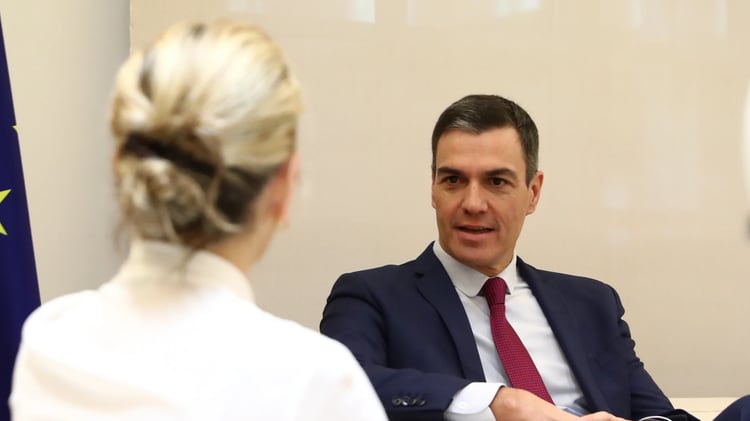Ángel Collado
Pedro Sánchez’s support for his vice-president Yolanda Díaz’s operation to bring together the extreme left with a new brand, Sumar, on the fringes of, or above, Podemos, has the PSOE in half of Spain in disarray.
With less than two months to go before the municipal and regional elections, the secretary general of the socialists is promoting a political project based on regional parties and populist leaders that compete directly with the PSOE for the left-wing vote.
Meanwhile, on the other side of the political map, the centre-right space is simplifying in the opposite direction: the Partido Popular is absorbing the remnants of Ciudadanos. If all the polls coincide in predicting a massive transfer of voters from the party founded by Albert Rivera to the option headed by Alberto Núñez Feijóo, councillors from important city councils such as Madrid and Zaragoza are ahead of the curve by abandoning Cs and asking for a place on the PP’s lists.
Sánchez is trying to stay in power by reorganising his coalition government with Podemos, without the most extreme leaders of the party now headed by Ione Belarra and Irene Montero and still led in the shadows by Pablo Iglesias. The chief executive, with his sights set on his particular run-up to the December general elections, prefers his current partners to be represented by a friendlier face, the vice-president and labour minister Yolanda Díaz.
The problem for the PSOE is that its secretary general’s convoluted plan fits poorly with the more immediate objectives of its regional leaders, especially in autonomous communities where far-left local formations are more consolidated and happen to be Díaz’s main supporters. This is the case of Más Madrid with its candidate Mónica García, who stands out as head of the opposition against president Isabel Díaz Ayuso, having obtained more votes than the socialist candidate, Ángel Gabilondo, in the 2021 elections.
The PSOE, now with Juan Lobato at the helm, aspires in Madrid to get ahead of García and regain at least second place to become an alternative to the PP.
The Socialists are also competing for the left-wing vote with other far-left regional formations in the Valencian Community (Más País), the Balearic Islands and Aragon, whose main leaders are participating in the Sumar operation promoted by Sánchez and the government media.
The only autonomous community president to escape the pre-electoral complications imported by Yolanda Díaz’s platform into the PSOE is Emiliano García-Page. In addition to disassociating himself from Sánchez for his favours and concessions to the pro-independence supporters, the head of the Castilla-La Mancha government has an absolute majority and does not need to compete for the votes of the extreme left before 28 March, nor does he count on their brands to remain in office.
Podemos did not reach the minimum number of votes needed to enter the regional assembly in the elections four years ago and the polls predict that it will remain outside. García-Page is gambling everything on revalidating his absolute majority against a PP on the rise, but pending the emergence of Vox.
In the Partido Popular they have preferred to see the most positive side that the Sumar operation and the open fight with Podemos and its different sectors could have for their electoral options. The more candidates their opponents present and the more division there is on the left, the greater the chances of success for the centre-right candidates, now weighed down only by Vox.
The first objective of the new PP leadership, to capture the centre-right vote as a bloc, has been achieved. All the polls, in line with the results of the regional elections held in Madrid and Andalusia, certify the end of Ciudadanos.
Only four years ago, the party founded by Albert Rivera, under the banner of centrist or liberal, challenged the Popular Party for electoral hegemony and was then able to enter all the regional governments presided over by PP leaders, such as Madrid, Murcia and Castilla-León. The same happened in city councils such as the Spanish capital.
In the run-up to 28-M the forecasts for Ciudadanos’ representation remain between 0 and 1 (only in Madrid) and the number of drop-outs and knocks on the door of the Partido Popular is multiplying. Regional leaders now have to decide whether or not to add Cs petitioners to their lists, but once they seem to have guaranteed the reabsorption of all centrist voters.






